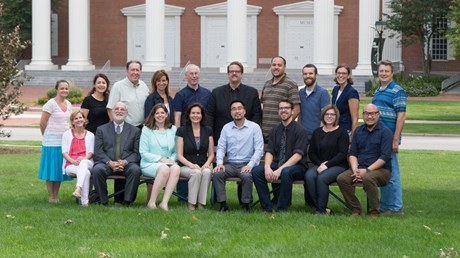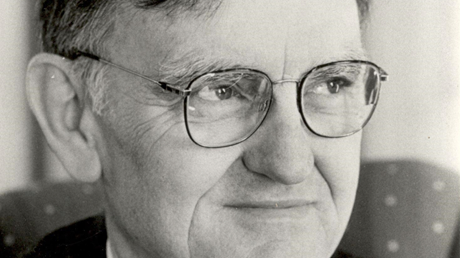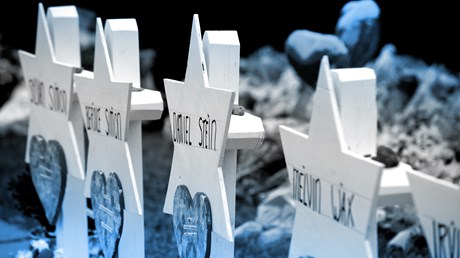Wednesday, 31 October 2018
Ephesians 1:18
from
https://www.biblegateway.com/passage/?version=NIV&search=Ephesians%201:18
Our Exchange Team is Amazing: The People Behind the Exchange
When I write something on The Exchange, someone else has almost always helped.

I read a tweet recently from Tyler Wigg-Stevenson, commenting on our new data, but also on my work output. He wrote: "Side note I am starting to believe @edstetzer is the name of a collective rather than an individual because I frankly don’t understand how a single person could sustain this level of output.”
It bothered me, not because it was unkind, but because I want people to know that we are, indeed, a team here. Sometimes we assume that people know that, but it is important that everyone know about our great team and their great work—which is why I so frequently tweet or comment about our team!
(The picture is of our whole Billy Graham Center team, but it makes the point that team really makes a difference.)
When I write something, you will sometimes see a shared byline at the front, or a “contributed to” at the end, of the article. However, it is important to note, that almost every time I publish something here, my team has helped. They may help research, or edit, or assist in the writing.
So, I want you to meet them.
Also, going forward—even when they are not co-authors or contributors—I am going to add a link to the bottom of each article in which they worked that says, “The Exchange Team assisted with this article.” They always do at some level. Sometimes they contribute their own articles, sometimes they edit or help with mine, etc.
I just don’t want anyone to think that I am doing all this alone. It would not be possible. And, to be honest, the articles would be pretty week without the input and suggestions of colleagues. (I should add that, if it were not for our main editor Laurie Nichols, you would hear more things that would get me in trouble, and ...
from
http://feeds.christianitytoday.com/~r/christianitytoday/ctmag/~3/krPqLD6of1o/sure-we-are-team-exchange-team.html
Theistic Morality and Improving the World
from
https://www.patheos.com/blogs/tippling/2018/10/31/theistic-morality-and-improving-the-world/
Respect and Humility: A Close Encounter with Those of Another Faith
People are drawn to Jesus with our actions—that is, when we are not condescending and arrogant.

A few weeks ago, I was outside doing yard work. Seemingly out of nowhere, two ladies appeared in front of my garage. One of them quickly said, “We were going to knock at your door, but here you are. Do you have a few minutes?”
I was a bit annoyed and replied, “As you can see, I am very busy so please don’t bother me. I am very busy.”
The other lady was persistent, “If you find time after your work, please read this.” I saw the magazine cover and the featured article: “The End of the World is Near.” Yet more irritated, I told them, “Please leave me alone. I don’t believe in your propaganda. Please take it next door.”
So they quietly left.
My son and daughter-in-law were there and heard everything I had said to my uninvited visitors. I asked them, “I was very rude, eh? They did not deserve that kind of treatment. I don’t think I was a good testimony and witness.” My son answer, “Yes, you were rude, Dad. We are embarrassed!”
Immediately, I went around the neighborhood looking for the two women. I caught up with them a few blocks away. I got out of the vehicle, gently spoke with them, and with a broken heart and crushed spirit, I said to them, “I apologize for my attitude. I am very sorry for being so rude to you. Please forgive me. May I have a copy of your literature? The cover page is interesting. In exchange, may I give you a gift? This is the DVD, The Life of Jesus according to the Gospel of John.” I received their magazine and they walked away with my gift.
Why do I share this with you? What is the value in all of this? Let me share just a few thoughts:
- Theologically speaking, all human beings are made in the image of God. We must treat others with kindness and respect. They are not our enemy; instead, they are blinded by the enemy. The hymn writer pronounced, “Rescue the perishing, care for the dying, Jesus is merciful ...”
from
http://feeds.christianitytoday.com/~r/christianitytoday/ctmag/~3/NmrmQ-kArYA/respect-and-humility-close-encounter-another-faith.html
He Gave Christian Researchers $100 Million. Now His Legacy Lives on Through Their Work.
Longtime Lilly Endowment executive Robert Wood Lynn died this month at 93.

While plenty of Christian leaders set out to serve the “common good,” the late Robert Wood Lynn asked, “But whose ‘common good’? Even more to the point, how would we know if we had served the good or not?”
As an educator then a longtime executive at the Lilly Endowment, Lynn dedicated his career to surfacing the answers and helping Christian institutions continue to make meaningful contributions to the shifting society around them.
At Lilly, one of the richest charitable foundations in the world, Lynn served as senior vice president for religion. Starting in 1974, he distributed $100 million in grants to fund research examining the role of Protestant institutions, according to a recent Christian Century tribute, written following his death this month at age 93.
Lynn was responsible for bringing evangelical scholarship, as well as other traditions, under the purview of Lilly’s generous philanthropy, funded by billions left behind by the pharmaceutical family—J. K. Lilly Sr., J. K. Lilly Jr., and Eli Lilly.
The Lilly Endowment continues to fund evangelical endeavors (full disclosure: both Christianity Today and fellow CT publication Church Law & Tax have received grants), with the organization recently granting $1 million for a church revitalization initiative through Wheaton College’s Billy Graham Center for Evangelism.
Lynn himself was a Presbyterian Church (USA) minister and served at Union Theological Seminary and Auburn Seminary before transitioning to Lilly, whose work overlapped with his interest in mainline Protestantism in America.
Thanks to the influence of his Yale Divinity School professor H. Richard Niebuhr, Lynn paid particular attention to America’s relationship ...
from
http://feeds.christianitytoday.com/~r/christianitytoday/ctmag/~3/lYYRbvQsXz0/lilly-endowment-robert-wood-lynn-legacy.html
The First Female Evangelists
Mary Magdalene and the woman at the well couldn’t help but share their good news.

We each have our notions about who is and who is not an evangelist. People like Billy Graham, who filled arenas, come to mind. Or perhaps we think of the person who first shared the gospel with us. Bold people. Gifted people. Often it is those who strike us as evidently holy people. Rarely do we think of ourselves as evangelists.
For some, the idea of evangelism causes fear and anxiety. Perhaps we’ve heard horror stories from others or we’ve had our own bad experiences with it. Our notions of evangelism might conjure up thoughts of a complex and slimy enterprise that involves Christians aggressively pushing our faith on others despite their protests. As a result, we may be disinclined to want any part of it.
But when we turn to Scripture, we find an evangelism that is much different than the corruptions we’ve experienced or of which we’ve heard. In the Old Testament, Isaiah 52:7 joyfully declares, “How beautiful on the mountains are the feet of those who bring good news, who proclaim peace, who bring good tidings, who proclaim salvation, who say to Zion, ‘Your God reigns!’” In Greek, “the evangel” essentially means “to tell good news, to bear witness, and to proclaim.” Princeton Theological Seminary professor C. Clifton Black tells us that New Testament authors use the term good news “to mean the news of salvation, or liberation from sin, brokenness, and estrangement from God. God reveals this good news through Jesus’ ministry, death, and resurrection.”
Isaiah tells us what we all know to be true: Those who witness and proclaim good news are beautiful—not odious. Don’t we all welcome good news—and the messenger by which ...
from
http://feeds.christianitytoday.com/~r/christianitytoday/ctmag/~3/dJIrNP9k0CY/first-female-evangelists-mary-magdalene.html
Tuesday, 30 October 2018
Pakistan Frees Asia Bibi from Blasphemy Death Sentence
Jailed Christian mother acquitted after eight years, but threats of violent nationwide protests persist.

Today the Supreme Court of Pakistan acquitted Asia Bibi of committing blasphemy against the Prophet Muhammad, a crime punishable with death in Pakistan, amid threats of countywide paralyzing protests and “horrible” consequences to the justices and the army generals if she was released.
Asia’s husband Ashiq Masih and their two daughters, currently in London, anxiously awaited her safe release from eight years of wrongful detention and reunion with her. The AFP reported that the Red Mosque (Lal Masjid) in the capital, Islamabad, which played a pivotal in 1980’s and 1990’s in recruiting and trainingmujaheedin for the Soviet-Afghan war, had filed a petition in the Islamabad High Court to put her name “on the no-fly list” so that she could not go out of the country: the Red Mosque “will become a centre for the anti-government movement if Aasia” is released.
Asia was the first Christian woman sentenced to death under Pakistan’s blasphemy laws and only the second to Ayub Masih, released in 2002, whose blasphemy case has gone up to the Supreme Court and released.
Earlier, on October 8, a three member bench—Chief Justice Mian Saqib Nisar, Justice Asif Saeed Khosa and Justice Mazhar Alam Khan Miankhel—heard arguments from both sides and reserved the verdict until today.
The hardline Islamic party, the Tehreek-e-Labaik Pakistan (TLP), held countrywide protests on Sunday (Oct. 14) and warned the justices would meet a “horrible” end if Asia bibi would be released. The TLP is “a staunch supporter of the blasphemy law and openly justify violence to safeguard what they call the honor of the prophet.” The current situation frightens the minuscule ...
from
http://feeds.christianitytoday.com/~r/christianitytoday/ctmag/~3/Iwd4kpiPgHo/asia-bibi-free-pakistan-blasphemy-death-supreme-court.html
1 Peter 5:8-9
from
https://www.biblegateway.com/passage/?version=NIV&search=1%20Peter%205:8-9
Loaded Questions
from
https://www.patheos.com/blogs/tippling/2018/10/30/loaded-questions/
Anti-Semitism and Unforgivable Sin
Hate is weak. Mercy is strong.

We at Christianity Today were grieved to hear about the mass shooting at a Jewish synagogue in Pittsburgh, claiming 11 lives. Sadly the local worshiping community has again become the place for the deranged to express their anger. It demonstrates how hate, which seems so strong, is often just cowardice, attacking the completely defenseless. So at such a time like this, let us not succumb to the fear of hate but remember how weak it really is.
It almost goes without saying that we will be praying that God’s miraculous mercy will be shown to the loved ones of the victims of this barbarous act. But we say it to make sure we do it. If hate looks strong but is ultimately weak, prayer is something that looks weak but is ultimately strong. So we pray as has the church in its liturgies for 2,000 years:
Lord have mercy.
Christ have mercy.
Lord have mercy.
It also nearly goes without saying that anti-Semitism is ugly, wrong, immoral, and a hundred other adjectives. But it appears it needs saying time and again. Perhaps the one word Christians can add to the many denunciations is to say that anti-Semitism is a sin.
Such a quaint word in our day, but for Christians there is no better or stronger word to signal that an act is profoundly wrong. When the sinful act harms another human being, it brings into play not just the human dimension but also the divine.
“Against you, you only, have I sinned,” penned David the adulterer and murderer in Psalm 51. An odd thing to say when at least two human lives—Bathsheba and Uriel—were immediately wounded by David’s sin (as were many others years later). David’s psalm does not deny that dimension—for there are many, many psalms that lament harm done to ...
from
http://feeds.christianitytoday.com/~r/christianitytoday/ctmag/~3/O3T1WAcKOSw/anti-semitism-unforgivable-sin-tree-life-shooting.html
Why Science Can’t Tell Us How to Live
The quest to detach morality from divine revelation has only led to one dead end after another.

Can science tell us how we ought to behave? In Science and the Good, a book that crosses the boundaries of history, philosophy, and psychology, sociologist James Davison Hunter and philosopher Paul Nedelisky examine nearly 400 years of scientific attempts to discover the sources and meaning of morality. That effort, they conclude, has failed. Science can tell us the way things are but not the way things ought to be. In the language of philosophy, it can’t derive an “ought” from an “is.”
Hunter and Nedelisky define the scientific quest for morality as an attempt to use empirical methods to discover universal principles for ethical action. The scientists and ethicists engaged in it operate from the assumption that everything about life on earth can be explained by natural processes alone.
Before the dawn of the Enlightenment era, late-medieval scholastics such as Thomas Aquinas had produced moral theories based on theological, rather than naturalistic, premises. They believed that through observation of the created order, one could discover the purposes for which God had designed particular creatures or activities—and the moral laws that flowed from those purposes. But in the 17th century, the Dutchman Hugo Grotius and other political philosophers wanted to discover a moral code that could operate without invoking God.
With Christendom split into competing factions that were slaughtering each other over sectarian disagreements, Grotius and like-minded intellectuals doubted whether religion could create a universal moral consensus. Could science succeed where religion had failed? Instead of speculating about divine purposes for creation, Grotius thought, moral theorists should ask one question: ...
from
http://feeds.christianitytoday.com/~r/christianitytoday/ctmag/~3/KY3oOStJhmI/science-good-james-davison-hunter-paul-nedelis.html